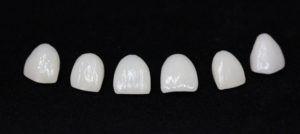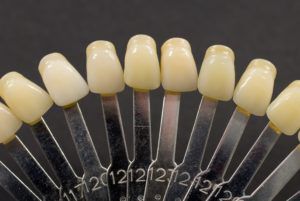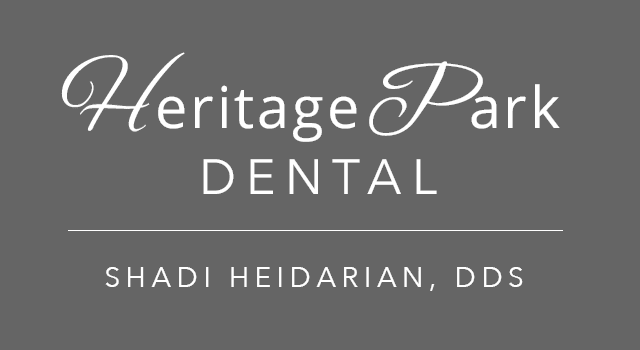Porcelain Veneers
Veneers are thin, tooth-shaped pieces of porcelain that are bonded onto the front surface of visible teeth to improve your smile’s appearance. They are customized to your unique facial shape and tooth color to blend with existing teeth all while reshaping your teeth and smile. Veneers are often used as an alternative to dental crowns and can remedy a variety of dental concerns. Although they are not permanent, like most dental restorations, they will offer years of functionality before requiring replacement.

Did You Know?
It is most common to have veneers placed on the top front eight teeth because these are the most visible when smiling to talking. However, veneers can also be used for a single tooth that is chipped or stained.
Frequently Asked Questions:
Am I a candidate for porcelain veneers?
You may be a candidate for porcelain veneers if you have certain dental conditions that you would like to resolve in order to improve your smile. Such dental conditions include:
- Crooked teeth
- Misshapen teeth
- Severely discolored or stained teeth
- Teeth that are too small or too large
- Unwanted or uneven spaces between teeth
- Worn or chipped teeth
However, you may not be an ideal candidate for veneers if you have existing tooth decay or gum disease. In some cases, a root canal may need to be performed and a dental crown may need to be placed instead of dental veneers. While veneers and crowns both offer solutions to the aforementioned issues, dental crowns encase the entire tooth and veneers only cover the front tooth surface. Dr. Heidarian will discuss these options with you in order to find the best treatment.
To find out if dental veneers are the right option for you, schedule a consultation with Dr. Shadi Heidarian of Heritage Park Dental today.
What are some of the pros and cons of veneers?
Dental veneers have a wide range of benefits, however like any other dental treatment, dental veneers do have problems. At a glance, veneers offer the following pros and cons:
Pros:
- Natural, aesthetic appearance
- Gum tissue responds well to porcelain
- Customizable
- Can easily improve a wide range of dental issues
- More conservative than other dental treatments
Cons:
- Cannot be reversed
- Can cause tooth sensitivity
- Cannot be repaired if they become damaged
- Are not a good choice for unhealthy, decayed, or weakened teeth, or for those with gum disease
- Cannot be whitened once they have been placed
What are veneers made of?

The vast majority of dental veneers are made from porcelain because it is highly durable, long lasting, stain resistant, and has a natural appearance. In some cases, veneers can also be made from composite resin, although this material does not last as long, nor does it have the same benefits as porcelain. This is why many dentists recommend porcelain veneers over dental composite veneers.
Additionally, there are also no-prep veneers, which do not require the removal of natural tooth structure prior to their placement. No-prep veneers such as Lumineers or Veneers, are made from porcelain, however there are other variations that can simply be applied with composite resin.
How long do dental veneers last?
Porcelain veneers can last about 10-15 on average. However, this is with the assumption that they are properly cared for. Caring for your porcelain veneers is similar to caring for your natural teeth. You should practice daily good oral hygiene habits such as brushing twice a day with fluoridated toothpaste and flossing once a day. You should also maintain your oral health by visiting Heritage Park Dental at least once every six months for your dental checkups and professional teeth cleaning.

In addition, you will also want to take special care not to damage your veneers by eliminating destructive behaviors. Examples of destructive behaviors include: smoking, nail biting, chewing ice, using your teeth as an opener, and grinding or clenching your teeth. With dental veneers, you will also want to chew primarily with your back teeth and wear a mouthguard if you grind your teeth or while playing sports.
You will also want to limit the amount of highly pigmented substances you consume, such as red wine. Although veneers are stain resistant, they can still stain over time if constantly exposed to highly pigmented substances. To avoid staining, it is important to practice proper brushing and flossing techniques after consumption of these substances.
What should I expect when having veneers placed?
At Heritage Park Dental, veneers are placed during two separate visits. During the first visit, your teeth will be properly prepared for veneers. To prepare your teeth for veneers, a thin layer of your tooth’s natural structure will need to be removed in order to make room for the veneer. As such, a small amount of your enamel will be lightly buffed and shaped.

Once your teeth have been properly shaped for the placement of a dental veneer, a dental impression will be taken of your mouth. For the dental impression, you will bite down into a metal or plastic tray containing a soft putty that will gradually harden into a rubber-like consistency. This impression will be used to make a mold of your mouth so that a dental laboratory can custom fabricate your dental veneers.
During the second visit, your teeth will first be cleaned so that the veneers can be adhered properly. Cleaning your teeth is also important because it ensures that no bacteria will become trapped underneath the veneers. Once your teeth are clean, a special cement is placed on your teeth and the veneers are placed over the cement. A special curing light is then used to harden the cement, effectively bonding the veneers to the front surface of your teeth.
What should I expect after having veneers placed?
Dental veneer placement does not have a lengthy recovery process. After your veneers are placed, you will be immediately able to return to your usual activities. However, it is recommended to avoid eating until the anesthetic wears off and you can feel your mouth again.
Right after your veneers are first placed, you may notice some rough spots here and there. This is usually because of excess cement and these rough spots will generally wear down within the first week. Also, after having veneers placed, you may experience a brief period of tooth sensitivity while your teeth adjust. This is primarily because the outer enamel was slightly removed and reshaped. Once your teeth have adjusted, the tooth sensitivity will usually fade.
What is the cost of veneers?
The cost of your dental veneers can vary, however an average cost of traditional veneers is $925-$2,500 per tooth. No-prep veneers are slightly cheaper at $800-$2,000 per tooth, however have about half the lifespan as traditional veneers. Because of this, traditional veneers are more cost-effective in the long run.
It is also important to note that because many dental insurance companies consider dental veneers to be a cosmetic dental procedure, they will not provide coverage. However, Heritage Park Dental offers a variety of financing options so you can get the smile you’ve always dreamed of.
To enhance your smile with porcelain veneers, schedule a consultation with Dr. Shadi Heidarian of Heritage Park Dental today! Heritage Park Dental serves Palo Alto and the surrounding communities.
